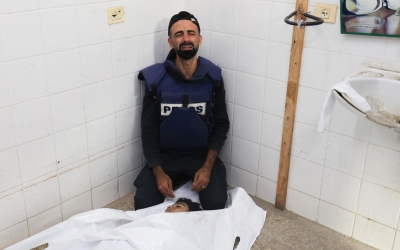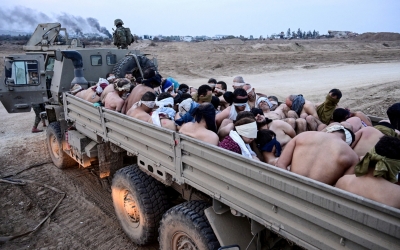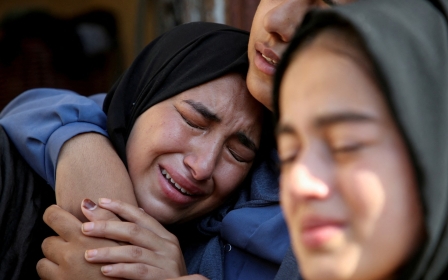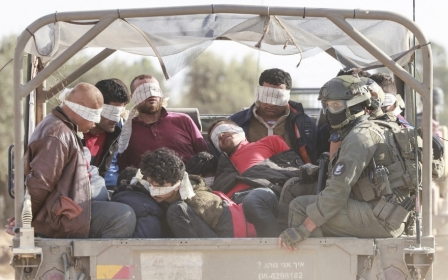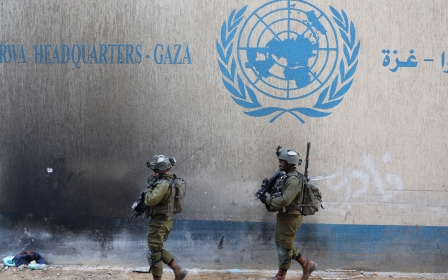Pain, loss, fear, panic, anger: Gaza's Palestinians are suffering psychological torment
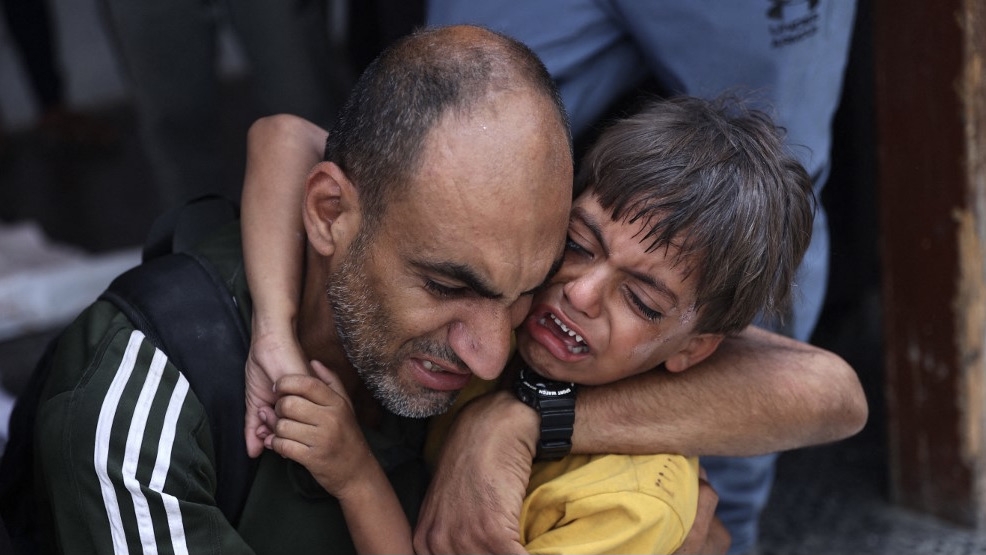
How are the people of the Gaza Strip, who have been displaced innumerable times and suffered staggering losses, coping with nine months of Israel’s military assault on every aspect of life?
The first detailed report of the mental health impact of the war has just been released by the Gaza Community Mental Health Programme (GCMHP).
Nine Months of Israel’s War on Gaza: the Mental Health Impacts and the GCMHP’s Response represents another challenge to the international community to end the inhumanity of this devastating military aggression that threatens the wellbeing of future Palestinian generations.
The report is researched and written by GCMHP staff who have since October 2023 seen two of their three centres destroyed, the third damaged, and three of their colleagues, all female psychologists, killed.
It details current work and future initiatives to mitigate the mental suffering of Gaza’s 2.2 million people and blunt the traumatic impact on future generations of their wounded society.
New MEE newsletter: Jerusalem Dispatch
Sign up to get the latest insights and analysis on Israel-Palestine, alongside Turkey Unpacked and other MEE newsletters
In its pages, survivors of the genocide speak from tents, ruined homes and temporary shelters to mental health professionals, themselves displaced and grieving like the patients they are treating.
Photographs show a mental health worker sitting on a chair taking notes while bent intently towards a patient, group meetings of women, group activities for children and pictures children have drawn.
Words of despair, excruciating mental pain, loss, fear, panic, anger, violence, uncontrollable shouting, helplessness, feeling suffocated, thoughts of suicide, or denial are the texture of the research.
The report calls for an immediate and lasting ceasefire (as did the UN secretary-general eight long months ago) and the entry and distribution of adequate supplies of fuel, water and food (as has every UN agency for months). Then, for the first time, it demands making psychological support a top priority and an essential part of humanitarian aid to Gaza.
Traumatised
GCMHP is an independent, non-profit organisation and the largest mental health facility in Gaza.
It was established in 1990 by Dr Eyad el-Sarraj, as Gaza was traumatised by three years of Israel’s military response to the unarmed uprising of civil society known as the Intifada. Sarraj, who was Gaza’s first psychiatrist, pioneered mental health research as well as treatment. He built a team of mental health workers, including many with experience of Israeli torture, prison and forced collaborations.
Follow Middle East Eye's live coverage of the Israel-Palestine war
After his death in December 2013, he was replaced as director general by psychiatrist Dr Yasser Abu Jamei who had been working in the programme since 2002.
Over 34 years, GCMHP has been supported internationally by Sweden, Norway, Germany, Switzerland, Ireland, the US, the European Commission, OCHA, OHCHR and the UN fund for victims of torture.
Most of GCMHP’s 57 professionals and 24 support staff have continued to be active during the war and contributed to the report’s findings. Twelve teams have provided psychological first aid to 13,000 people between 7 October 2023 and 15 June 2024.
They heard people describe how this war is “different quantitatively and qualitatively in all aspects of life, with everyone witnessing real soldiers’ battles, repeated violent scenes of killing and wounding never seen before, hunger, cold, disease and forced displacement multiple times”.
The teams report “high levels of feelings of helplessness and despair”, and complex trauma symptoms including social isolation, adults who are disconnected from their feelings, who have lost the ability to express themselves, and lost self-confidence.
Psychosomatic physical symptoms are common, such as breathlessness, and joint and stomach pain.
Children’s psychological symptoms include night terrors, nightmares, bedwetting, excessive nervousness, intense attachment to the mother, constant shaking, hallucinations, anger and aggressive behaviour.
Children are also taking on new daunting responsibilities relating to the families’ daily needs for food and water, replacing adults lost to arrest or death.
Torture
A torture survivor, AM, is one of those whose story is in the GCMHP report.
“He is a young man who took shelter with hundreds of other families at al-Aqsa University in western Gaza City. Israeli tanks besieged the campus for 10 days before invading it, segregating women from men, and then arresting them.”
He told mental health workers that “the Israeli soldiers invaded the premises and started to blow up one building after another. Then they tied us up and blindfolded us after they had made us strip down to our underpants,” AM said.
“They almost shot me dead on several occasions. They beat me up and hit me in the groin and on the head. It was early in February and the weather was bitter,” he added.
AM was dragged into a hole filled with decomposed bodies… He was made to see other prisoners being executed point-blank
All that was just a prelude to 80 days of physical abuse and torture. AM was dragged into a hole filled with decomposed bodies; and thrown on the ground where passing tanks touched his legs. He was made to see other prisoners being executed point-blank.
“The next day they transferred us on a truck to Gaza’s borders. I was still tied up, blindfolded and naked. They threw us off the truck and one soldier kicked me in the scrotum. I couldn’t walk for 16 days because of the impact of that hit on my private parts,” he explained.
“In the concentration camp, they made me take off my underpants to be starkly naked, my arms were tied to my back and pulled up in a very painful position.
"I spent the whole night in such a posture, which made it impossible for me to sleep. For a whole night, I remained in that position until I felt that my arms did not exist. Then I was transferred to al-Eizariya prison in Jerusalem. I was in a very bad health condition.”
'Excruciating mental pain'
AM went on to talk of the ongoing abuse he experienced before being "transported in a truck, 34 men and one woman. On the way, we were subjected to insults and beating. We were threatened that if we talked about what happened to us, we would be arrested again, even if we were in the middle of Gaza.
“When we arrived, Unrwa received us at the Karem Abu Salem crossing and we were given water to drink. They asked me if I knew where my family was. I shook my head. Then they gave me a phone so I could call my family, who told me that they were still in Gaza City. Here I felt a strange feeling of mixed fear and joy. Thank God they are fine.
"I felt so overwhelmed by emotions that I passed out. However, my father was not in Gaza City with the rest of the family, he was forced to leave for the south by the Israeli soldiers. So, he came and took me to the shelter where he stays in al-Maghazi. There I was not treated as I was supposed to be. A mattress was not provided for me to sleep on for several days - I did not receive the help and attention I needed.”
A GCMHP team visited AM, diagnosed PTSD and gave him drug therapy and therapeutic sessions to help his symptoms. The team also visited the shelter management, explained his special needs and made sure he was provided with a mattress, food and water. He is still under therapy and being closely followed.
Another survivor, AD, was a family man working in Israel, one of many Gazan workers arrested there after 7 October. He was interrogated for 24 days, starved, sleep deprived, beaten up cruelly, and mentally tormented, the report says.
Later he sought help from GCMHP, and described his return to the Karem Abu Salem crossing where Israeli soldiers told the prisoners to run to the nearest point to Gaza.
“The soldiers started shooting at us as we ran. The bullets were coming from all directions," he said. "Some prisoners were injured, and others were shot dead. I ran as fast as I could, and then one of the men just running next to me was injured and fell on the ground. I carried him on my shoulders and kept going until I reached an Unrwa medical point. We were provided with first aid and sent to al Najjar hospital in Rafah.”
But AD’s homecoming brought him even deeper grief. He soon learned that on 17 October, while he was in prison, his home was bombed and his wife, children, mother, siblings, uncles and aunts all died there together. Only his father remained alive, but he was far away in Gaza City, cut off from the south where AD was.
AD came for professional help to GCMHP “in excruciating mental pain. He had become alone overnight. He lost his loved ones who were his strength and gave his life purpose. The team visited him in his tent (in a very bad environment that hundreds of thousands of displaced people suffer). AD was diagnosed with PTSD. As part of our intervention, AD has been placed on drug therapy and he will be provided with psychological sessions according to the protocol.”
Hope
In an ocean of need, these men found hope.
Among the hundreds of children’s drawings to be seen on the GCMHP website is hope - in smiling suns and trees and flowers among the dark images of bombs dropping, helicopters and fire.
In the years before this war, several international reports highlighted that in a Gaza under siege for 17 years there were already 500,000 children in need of mental healthcare. There are so very many more now.
Before this war, several international reports highlighted that in a Gaza under siege for 17 years there were already 500,000 children in need of mental healthcare
A ceasefire is in the hands of those western governments arming Israel and tolerating Prime Minister Benjamin Netanyahu’s evasion of a ceasefire against the wishes of so many Israelis.
It cannot be delayed any longer.
Safety and hope are the keys to the future in this report. For mental health professionals to work effectively they need safety, which includes, beyond a lasting ceasefire, “an end to all human rights violations, and removing visible signs that trigger trauma, including clearing all the rubble on the streets”.
These are the practical demands of hope and ambition.
There is here, too, the visionary challenge that the 3,000 psychologists now living in Gaza could, with funding and additional training, mitigate the mental suffering of their own 2.2 million people and future generations, as the staff of GCMHP have been doing through these nightmare war months.
The views expressed in this article belong to the author and do not necessarily reflect the editorial policy of Middle East Eye.
Middle East Eye delivers independent and unrivalled coverage and analysis of the Middle East, North Africa and beyond. To learn more about republishing this content and the associated fees, please fill out this form. More about MEE can be found here.



